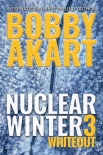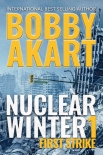Nuclear Winter Whiteout Bobby Akart (love letters to the dead .txt) 📖

- Author: Bobby Akart
Book online «Nuclear Winter Whiteout Bobby Akart (love letters to the dead .txt) 📖». Author Bobby Akart
He instructed the chairman of the Joint Chiefs to assemble regional strike forces to move into the rural areas of America, where communities tried to isolate themselves from the rest of the nation. They were instructed to open highways, by force, if necessary. If a community failed to cooperate, a larger contingent would be ordered in to sweep the homes for weapons and hoarded food.
As for the Keys, he saw the importance of the southernmost point in the U.S. to the rebuilding effort. Their location in the southernmost latitudes of the country provided an opportunity to grow food and raise livestock. Of course, it would require a colossal effort to remove buildings and hard surfaces to make way for truckloads of topsoil. The Keys would be converted from a tourist mecca to America’s new breadbasket until the clouds of soot and smoke lifted. After that, it could become a national park for all he cared.
The president pulled Chandler into his office and gave the orders. He wanted U.S. military troops from outside of Florida to deal with the problems in the Keys. He’d already dealt with military leaders at Fort Hood and Fort Bliss, who refused to follow orders because their loyalties had shifted to their home state. He ordered the troop contingent to halt the insurrection in the Keys to be deployed from Fort Benning on the Alabama-Georgia border just outside Columbus.
Within hours, the eighty-eight-vehicle convoy of Humvees, troop carriers and logistics support vehicles were traveling down Interstate 75 toward the rally point at Homestead Motor Speedway.
Part VI
Day nineteen, Tuesday, November 5
Chapter Forty-Five
Tuesday, November 5
Overseas Highway at Cross Key
Florida Keys
It was the middle of the night when Peter entered the stretch of Overseas Highway that connected the Mainland to the Upper Keys. The tiny islands upon which the two-lane divided highway was built were mostly uninhabitable except for the Manatee Bay Club approximately five miles from the point where the boys said the roadblock was set up.
Peter knew the location well. An access road had been built on both sides of U.S. 1 leading to Gilbert’s Resort, a small hotel and tiki bar known for being home to a number of racing catamarans. The access road looped under the highway, so any cars denied access could be directed back toward Homestead.
At this hour, he assumed the road would be desolate. He was wrong. In addition to abandoned vehicles, there were pedestrians walking in both directions. Occasionally, a vehicle would force its way through the throngs of people.
Conversations were had across the concrete divider as those who wanted access to the Keys quizzed those leaving about the requirements to get in. Many tried to develop stories to con their way past the many armed guards who stood vigil at the entrance.
Friend of a friend. Long-lost family member. Dual residency. Been off to college. Lost my license. Identity theft.
The list of excuses for not being able to show photo identification was long. Peter wasn’t sure how he was going to overcome the deficiency. He simply hoped a familiar face would be present. Or, at the very least, someone who knew the Albright family well enough to confirm his story.
He joined a pack of refugees shuffling past the aqueduct’s pump station. Fresh water was pumped to the Florida Keys through a series of aqueducts connected to a one-hundred-thirty-mile-long water main. It was the only source of fresh water and was used by the Albright family to fill its own water tower on Driftwood Key. Now, with the power grid down, the pump station wasn’t working, causing survival in the Keys to be even more improbable for most people.
He walked another thousand feet until Barnes Sound was on his left. Because of the darkness, he couldn’t see across the fairly large body of water toward the toll bridge. As the people in front of him began to bunch together, waiting their turn to enter the Keys, he realized he was more than a mile away. He shook his head in disbelief and prepared himself to wait hours for the opportunity to enter.
As he shuffled along with the others, he continued to eavesdrop on conversations. He was amazed at the quest for information. For many, it appeared to be more important than food and water. Misinformation seemed to run rampant as well.
Rumors of more nuclear missile strikes on U.S. soil were common. Confirmation of Mexico shutting out American refugees was confirmed by a number of people. Texas had closed off their borders to outsiders. It was believed they were still operating their power grid without a single blackout episode.
None of them seemed to be aware of the National Guard presence at the speedway. He didn’t dare ask, as he preferred not to draw attention to himself. However, when nobody made reference to it, he began to question the veracity of the teenage boys he’d spoken with.
Having witnessed the number of stalled cars on the Overseas Highway coupled with the throngs of people making their way in both directions in the middle of the night made him wonder how they’d cross the sound to begin with. And if the barricades were in place as the teens said, that bridge would be impassable without a significant amount of work by some heavy-duty Caterpillar front-end loaders.
The wave of refugees came to an abrupt halt, and they began to bunch together. Some eased down the embankment and fought along the mangrove trees to cut ahead of the others. This drew the ire of some, and hostile words were exchanged.
Peter noticed the number of refugees heading off the Keys was less, so he sat on the concrete barrier and swung a leg over to the other side, followed by the other. To avoid walking against the flow of pedestrian




Comments (0)